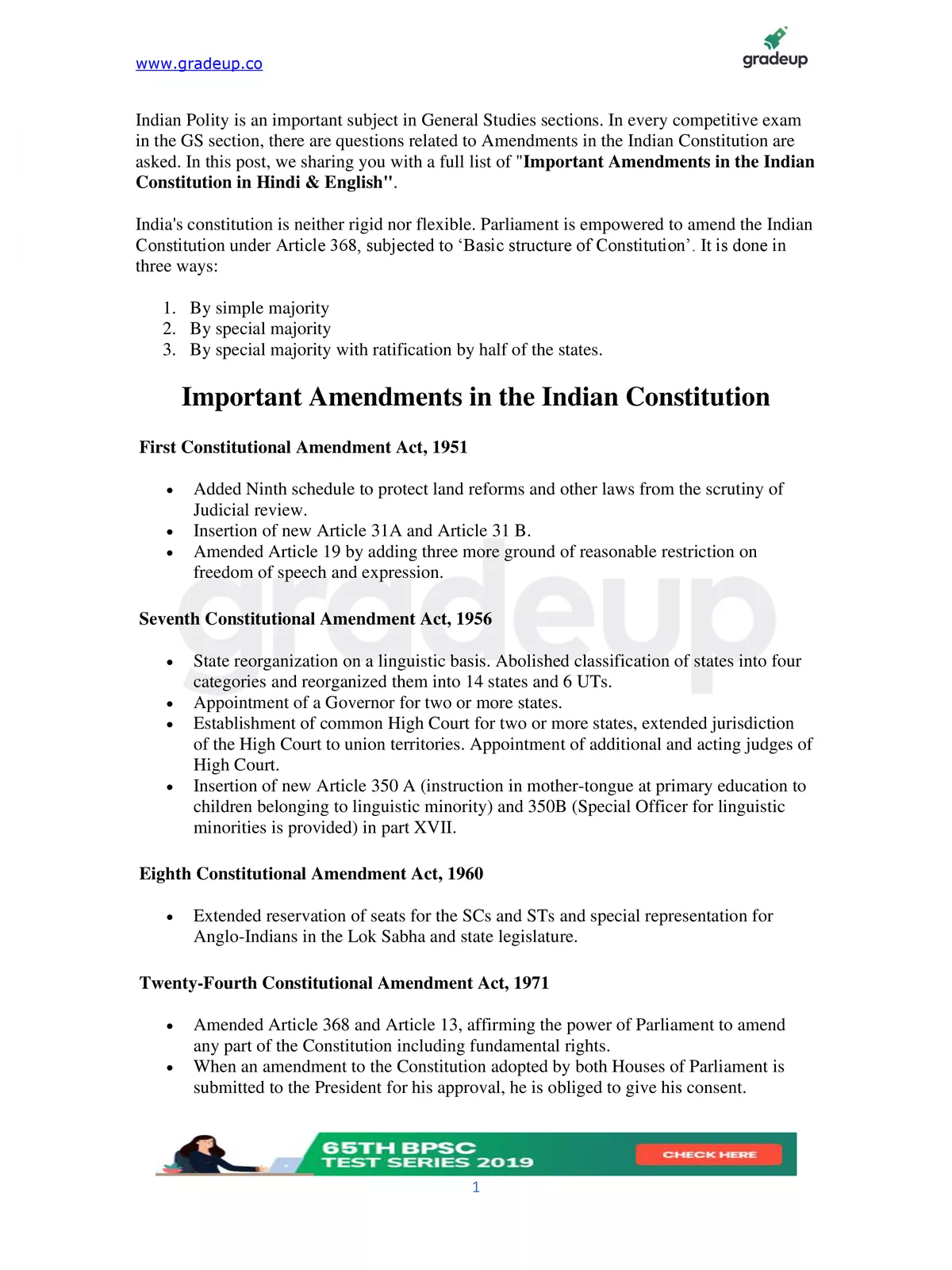Indian Constitution Amendments List 2025 - Summary
The Indian Constitution has been changed 105 times so far, each bringing important updates to the country’s political and legal setup. The latest change is the 105th Amendment Act, passed in 2021, which was part of the 127th Constitutional Amendment Bill. These changes show how the Indian Parliament has the power to modify the Constitution under Article 368 of Part XX, covering various areas like governance, rights, and state reorganisation.
Overview of Important Indian Constitution Amendments
| S. No. | Enforced Since | Amendments | Objectives |
|---|---|---|---|
| 1st | 18 June 1951 | Changed Articles 15, 19, 85, 87, 174, 176, 341, 342, 372 and 376; Added Articles 31A and 31B; Introduced Schedule 9. | Added special rules for helping socially and educationally backward classes and Scheduled Castes and Tribes (SCs and STs). Supported the end of the zamindari system. Added Schedule 9 to protect laws from being challenged in courts if they affect property rights or freedom of speech. |
| 2nd | 1 May 1953 | Changed Article 81(1)(b). | Removed the population limit for parliamentary constituencies, allowing proportional representation based on population. |
| 3rd | 22 February 1955 | Changed Schedule 7. | Added trade and commerce of essential items like food, cattle fodder, cotton, and jute to the concurrent list for better management. |
| 4th | 27 April 1955 | Changed Articles 31, 31A, and 305; Changed Schedule 9. | Put more restrictions on property rights and added protective laws in Schedule 9. |
| 5th | 24 December 1955 | Changed Article 3. | Gave the President power to set and extend time limits for State legislatures to give opinions on bills for creating or changing States. |
| 6th | 11 September 1956 | Changed Articles 269 and 286; Changed Schedule 7. | Changed Union and State Lists related to taxation powers. |
| 7th | 1 November 1956 | Changed many Articles including 1, 3, 49, 80, and others; Added Articles 258A, 290A, 298, 350A, 350B, 371, 372A, and 378A; Changed Part 8; Updated Schedules 1, 2, 4, and 7. | Reorganized States based on language, ended State classifications (Class A-D), and introduced Union Territories. |
| 8th | 5 January 1960 | Changed Article 334. | Extended reservation of seats for Scheduled Castes, Scheduled Tribes, and Anglo-Indians in Lok Sabha and State Assemblies till 1970. |
| 9th | 28 December 1960 | Changed Schedule 1. | Adjusted territorial boundaries after agreement between India and Pakistan. |
| 10th | 11 August 1961 | Changed Article 240; Changed Schedule 1. | Made Dadra and Nagar Haveli a Union Territory after acquiring it from Portugal. |
| 11th | 19 December 1961 | Changed Articles 66 and 71. | Changed election of Vice President to Electoral College of Parliament members. Protected election validity from legal challenges based on electoral college vacancies. |
| 12th | 20 December 1961 | Changed Article 240; Changed Schedule 1. | Made Goa, Daman, and Diu Union Territories after annexation from Portugal. |
Important Recent Amendments for UPSC and Indian Constitution Amendments PDF Download
The 105th Amendment, passed in 2021, gave back powers to state governments to identify and recognize Socially and Educationally Backward Classes (SEBCs). This was needed after the 102nd Amendment gave the Central Government exclusive power to maintain lists of such classes, limiting states’ ability to provide reservations.
In 2019, the Maharashtra government’s 16% reservation for the Maratha community was challenged in court because it went beyond Supreme Court limits on total reservations and because the state government’s power was limited by the 102nd Amendment. To fix this, the 105th Amendment restored states’ rights in this area.
The 102nd Amendment, passed earlier in 2018, gave constitutional status to the National Commission for Backward Classes (NCBC) and the Central Government’s authority to keep the list of Other Backward Classes (OBCs) through Articles 338B and 342A.
For detailed study or reference, you can download the Indian Constitution Amendments PDF using the link provided below on the website.
